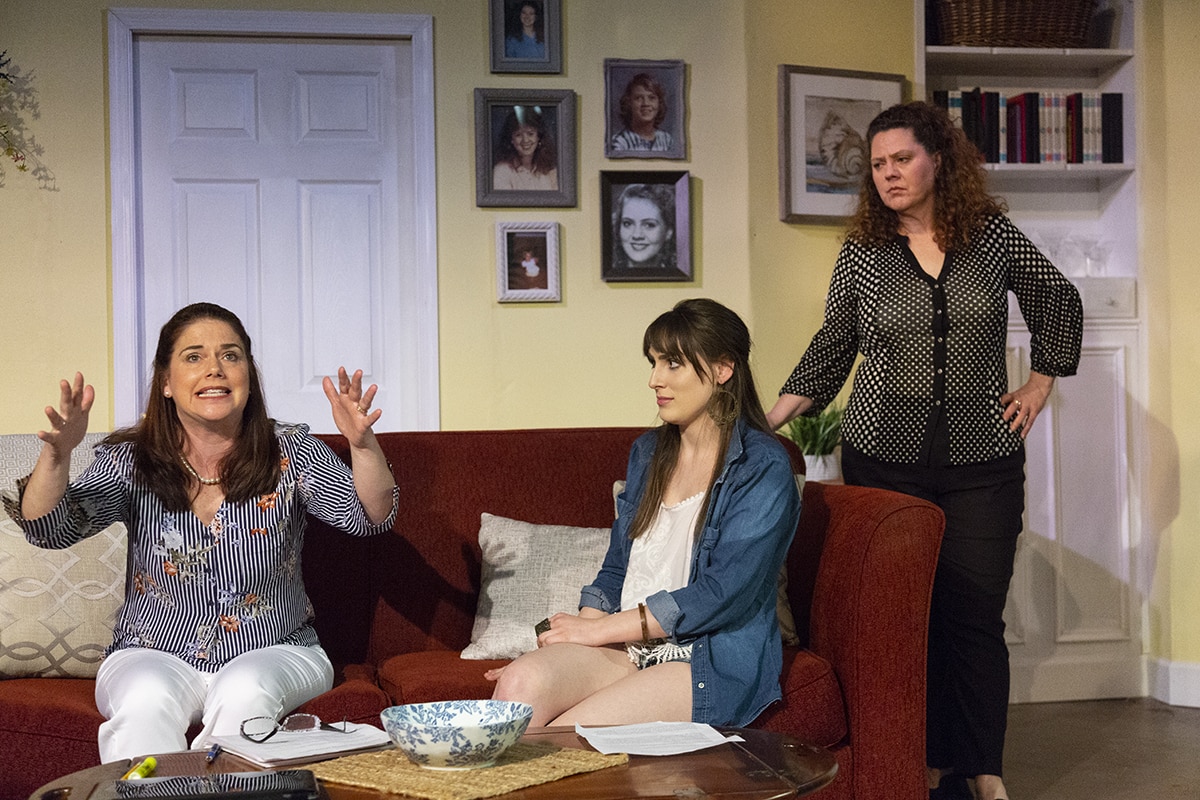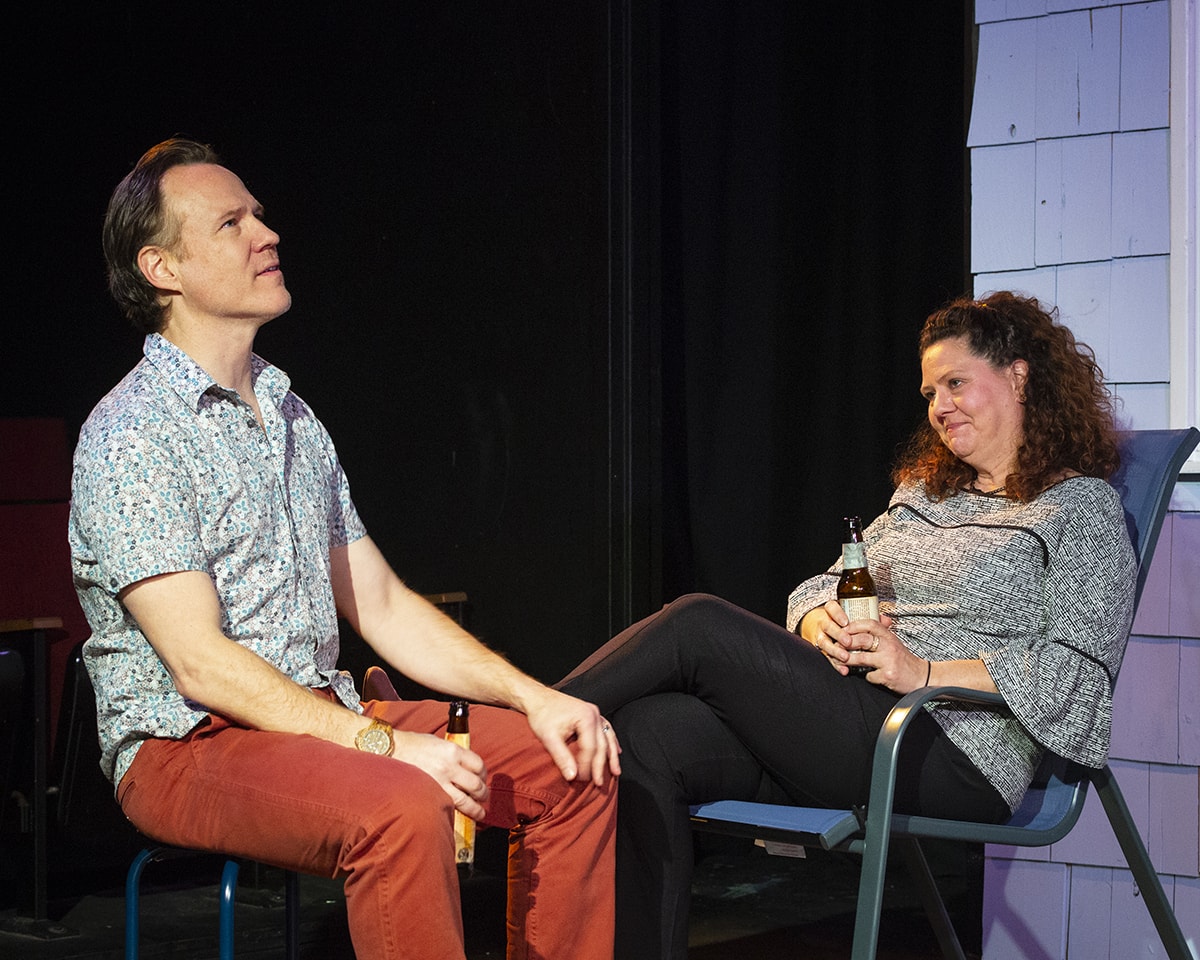There are potholes in the road not taken. So discover many of the characters in Gina Gionfriddo’s Rapture, Blister, Burn, now being presented by the Maryland Ensemble Theater (MET) in Frederick, Maryland.

The setup for Gionfriddo’s play – which had a successful off-Broadway run in 2012 and many regional productions since – involves a visit by Catherine (Laura Stark), to a New England college town to take care of her mother, Alice (Carol Randolph), who recently had a heart attack. Catherine is an academic, specializing in feminist takes on such subjects as internet porn, horror movies, and political torture. She has had great success in New York, publishing two books and appearing on the Bill Maher show. She has had numerous sexual liaisons, some good, some bad, but now, at 42, she wonders if she has missed out on something more valuable by not having a husband and children. She, above all, fears being alone, without someone who truly loves her, when her mother dies.
Parenthetically, Alice, who recently had an apparently serious heart attack, shows few signs of frailty or encroaching mortality. Randolph’s robust, energetic, cheerful version of the character seems likely to survive for quite some time, Catherine’s forebodings notwithstanding.
Living in the same town are Catherine’s grad school flame, Don (Ron Ward) and his wife Gwen (Gené Fouché), Catherine’s onetime roommate who married Don after Catherine went off to London on a fellowship. Despite loving their two sons, their relationship is not a happy one. Don is a thoroughly unambitious college administrator, preoccupied with pot and porn, though in Ward’s portrayal retaining a certain slacker charm. Gwen, a recovering alcoholic, laments her seemingly dead-end, mostly sexless, financially insecure marriage, envying the more exciting life she sees Catherine as living.
The dynamic between Catherine and Gwen tends to be rather schematic: career woman vs. mother/homemaker. Both dissatisfied with the lives they have chosen, they imagine living the other’s life. So if they were actually to try doing so, what could possibly go wrong?
The first act centers on a summer seminar in feminist theory and popular culture given by Catherine, with only two students: Gwen and her 21-year old former babysitter, Avery (Madeline Reinhold). On first appearance, Avery might seem to be a minor comic character. As the seminar and the play go on, she becomes far more important, and it is fair to argue that – especially in Reinhold’s vibrant performance as this brash, opinionated, vulnerable, sometimes wise, young woman – Avery becomes the central character in the play. It falls to Avery to question the thoughts, theories, assumptions, and life choices of the other characters. A high percentage of her lines are questions, in fact.
The seminar, full of wry, often extremely funny, discussions of Betty Friedan, Phyllis Schlafly, Nancy Friday, and the Equal Rights Amendment, is both the intellectual and comic highlight of Gionfriddo’s script. The actors do a fine job of playing the intersection of the personal and political, as revelations of the history and feelings of the characters emerge from the academic discussion. With Alice popping in from time to time with cocktails and an older generation viewpoint (e.g., the old canard that if a man gets milk for free, why would he buy the cow?), the tri-generational free-for-all is a delight worth taking seriously.

One writer on sexual politics that the play does not reference – one scorned by most feminists– is Helen Gurley Brown, whose take on women, men, and marriage would have been an interesting addition to the seminar. For Brown, sex and romance were too unpredictable. The workplace, despite its ups and downs, was a far safer bet. In Sex and the Single Girl, Brown wrote “I think marriage is insurance for the worst years of your life…During your best years you don’t need a husband.” Catherine starts contemplating the virtues of a traditional wife/mother role at the time she is thinking about upcoming bad times in her life, the potentially lonely interval between middle age and death. It is fun to speculate on whether Catherine would ever have picked up a copy of Cosmopolitan at the grocery store checkout line.
The production’s pace slackens in the second act, which takes on more of the character of a domestic drama. And in this domestic drama, one may ask why these two women are so attracted to Don, who seems the sort of man a rational parent would caution a daughter against. Through no fault of Ward, whose loose, laid-back physicality is very appropriate to the character, Don often feels like a blank slate on which Catherine and Gwen project their feelings about what they want their lives to be (the script has Don making a comment somewhat to this effect). Don doesn’t get to muse on alternatives to his life choices (compare “The Road You Didn’t Take” in Sondheim’s Follies), and he might not even be interested in doing so. It wouldn’t be fair, however, to insist that Gionfriddo make Don a truly interesting, compelling character; to do so would be to fall into the critical sin of asking a playwright to write a different play. But Don’s blankness makes Catherine’s renewed passion for him less than fully credible.
The acting is fine throughout. Fouché’s rather tense, tight physicality suits Gwen well, particularly in a seminar session just after she realizes Don and Catherine have become involved. Stark’s facility in articulating the views of the writers she discusses is very convincing for the academic Catherine is, although Stephanie Hyder’s costume design might have better assisted in making her appear a more glamorous, big city contrast to the small college town setting of the play.
Eric Berninghausen’s believably decorated domestic set fits well into MET’s limited playing space. Director Suzanne Beal’s blocking of the action on the set is somewhat static at times, notably in early scenes where much of the audience gets to see only Catherine’s back. She keeps the ensemble’s interaction and timing spot on through most of the proceedings, which is far more important in a play where the conflict is verbal rather than physical.
Running Time: Two hours and 30 minutes, including a 15-minute intermission.
Rapture, Blister, Burn plays through April 29 at the Maryland Ensemble Theatre, 31 W. Patrick St., Frederick, MD. For tickets, call MET at 301-694-4744 or go online.




